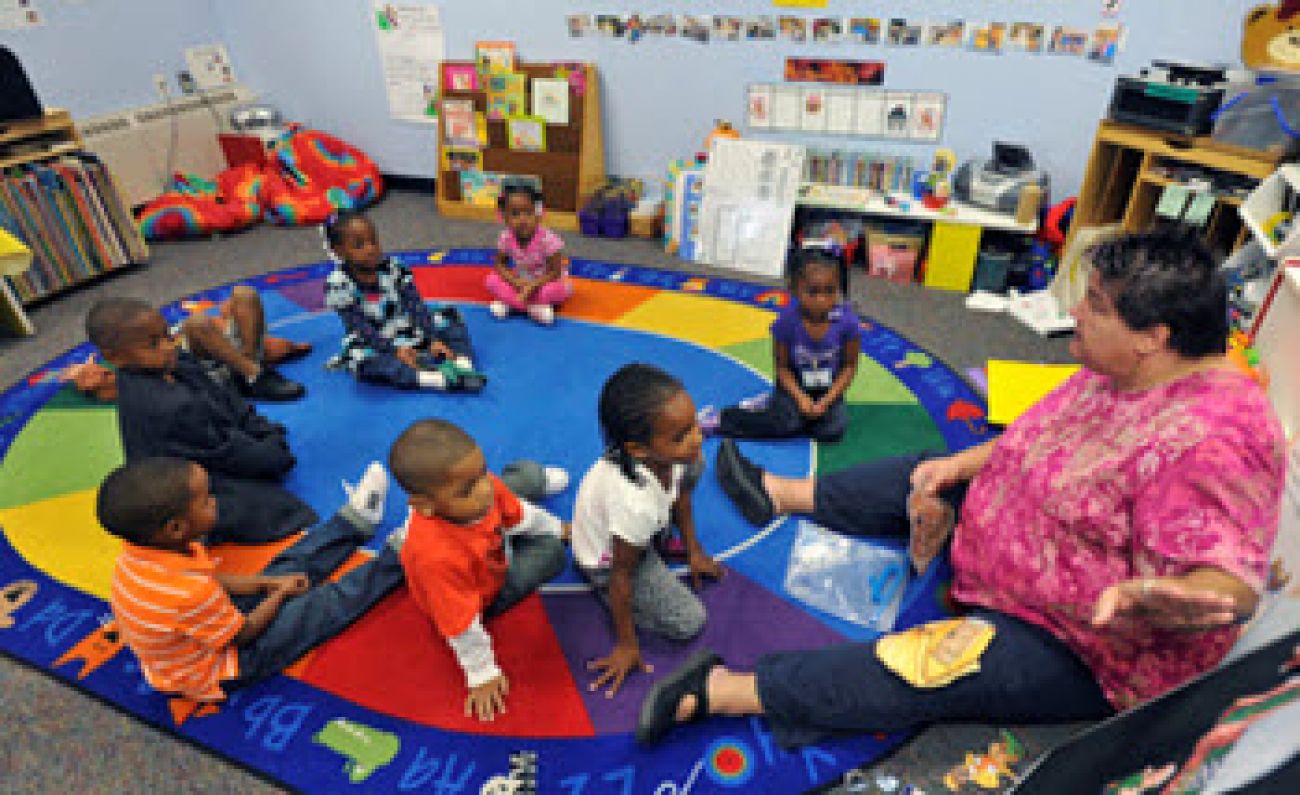Grand Rapids preschool effort strained by budget trends

For Joanne Kelty, the economics of Michigan’s preschool program become more vexing each year. She supervises a program for Grand Rapids Public Schools considered to be a model for the state, with vocal support from the district’s superintendent and school board.
Yet every year, the district has fewer 4-year-olds in class.
"I hold my breath every year," Kelty said. "We’re already at the minimum number of weeks (of class allowed by the state). We’ve cut back on transportation. We’re servicing fewer kids.
"I’m really concerned about what is going to happen this year."
 The Great Start Readiness Program provides free preschool for Michigan 4-year-olds from homes with incomes under 300 percent of the federal poverty line ($69,150 for a family of four). Do you qualify? But the cash per child given by the state for the program has dropped 23 percent since 2000, when inflation is taken into account. The result is more kids locked out of classrooms, despite studies LINK showing those classes have a huge, long-lasting benefit.
The Great Start Readiness Program provides free preschool for Michigan 4-year-olds from homes with incomes under 300 percent of the federal poverty line ($69,150 for a family of four). Do you qualify? But the cash per child given by the state for the program has dropped 23 percent since 2000, when inflation is taken into account. The result is more kids locked out of classrooms, despite studies LINK showing those classes have a huge, long-lasting benefit.
Grand Rapids is a microcosm of the challenges schools face with a program that is good for children, but bad for budgets.
State payments don't cover costs
The state provides $3,400 per student for half-day preschool programs for eligible 4-year-olds. The actual cost of the program in Grand Rapids schools is closer to $5,000 per half-day slot.
‘It’s not less expensive to run a preschool classroom," Kelty said. "In fact, it costs more because of the requirements for staffing." GSRP limits classes to 16 children with one certified teacher and one paraprofessional. In Grand Rapids, some GSRP teachers are veteran educators earning $68,000 a year.
That’s where the arithmetic gets complicated.
Some years, the district used federal Title I education funds to balance the books. Other years, it used a federal grant meant to enhance early reading programs. Eventually, those bookkeeping tricks weren’t enough to maintain the program as it existed.
"We were running the program for 38 weeks (roughly as long as the k-12 school year)" said Kelty. "We cut it back to 30 weeks, the minimum required."
That left at-risk children with 21 percent less class time to get ready for kindergarten. The cut also meant long-time GSRP teachers were getting paid based on 30 weeks rather than 38. When full-time elementary school positions opened up, GSRP teachers took them, leading to high teacher turnover in the preschool classes.
"The quality of your program suffers," Kelty said. "Access to pre-K is one thing; access to quality pre-K is another. You have to be run in a quality manner or you’re not helping."
Grand Rapids used to offer bus transportation to all its GSRP students. "Then we transported every child more than a half-mile from a school," Kelty said. "This year, we’re only transporting children who live more than a mile from a school. We were spending half a million for transportation for everyone; now, maybe $200,000."
But for some children, no bus means no preschool. "The neediest families are the ones with no transportation," Kelty said.
Meanwhile, the district converted a lot of its half-day preschool programs into full-day classes. That’s good news for students in those classes, but bad news for 4-year-olds on bulging waiting lists. School districts participating in GSRP get a certain number of half-day preschool slots; once those slots are used, children go on a waiting list. Converting to full-day classes means each student uses two slots, in effect cutting the number of children in preschool by half. The district used to provide preschool for 830 children from low- and moderate-income households. Today, about 600 are in classes.
"We prioritize by need at the end of the summer," Kelty said. Most who are enrolled have household incomes below about $30,000 a year for a family of four, even though those making more than double that qualify for the free preschool.
Those families often are forced to either pay for private day care, or keep their children at home.
"The kids at 300 percent (of federal poverty line), those kids need it just as much, but we can’t provide the services," Kelty said. "We have one class of 16 that has a waiting list of 22.
"I feel bad for parents who call, who see the preschool program in their schools. They just assume it’s part of the school, part of the services they should receive. But the dollars it takes to do it aren’t there yet."
Waiting for good news
Four-year-old Britian Potts is on a waiting list for GSRP in Grand Rapids. Her brother, 6-year-old Tory, attended GSRP two years ago. "He loved it,’ said Tory and Britian’s mother, Toi Hudson. "Now he’s doing excellent in school.
"We work with Britian at home a lot," Hudson said. "We do numbers. She does colors. She will tell me the numbers on a clock. I’m doing my best but I’m definitely not a teacher."
Next year will bring fresh challenges for Great Start in Grand Rapids. The district will likely close up to 15 schools next year as a result of shrinking enrollment and a tight budget. Kelty said there may be trouble finding enough rooms in the remaining schools for the preschool classes.
According to Kelty, there are about 1,700 kindergarteners in Grand Rapids. Head Start, the federal preschool program for low-income children, serves about 500 4-year-olds, and Great Start serves another 500. Kelty said almost all children in Grand Rapids qualify for Great Start (89 percent qualify for free and reduced lunch), so that leaves another about 700 children who could be getting free, high-quality preschool if the state provided enough funding.
Hudson thinks it would be money well-spent. "The more education you have, the better for these children," Hudson said. "If you start early with that seed, it blossoms."
Senior Writer Ron French joined Bridge in 2011 after having won more than 40 national and state journalism awards since he joined the Detroit News in 1995. French has a long track record of uncovering emerging issues and changing the public policy debate through his work. In 2006, he foretold the coming crisis in the auto industry in a special report detailing how worker health-care costs threatened to bankrupt General Motors.
Bridge contributor Ted Roelofs contributed to this report.
Michigan Education Watch
Michigan Education Watch is made possible by generous financial support from:
Subscribe to Michigan Education Watch
See what new members are saying about why they donated to Bridge Michigan:
- “In order for this information to be accurate and unbiased it must be underwritten by its readers, not by special interests.” - Larry S.
- “Not many other media sources report on the topics Bridge does.” - Susan B.
- “Your journalism is outstanding and rare these days.” - Mark S.
If you want to ensure the future of nonpartisan, nonprofit Michigan journalism, please become a member today. You, too, will be asked why you donated and maybe we'll feature your quote next time!


